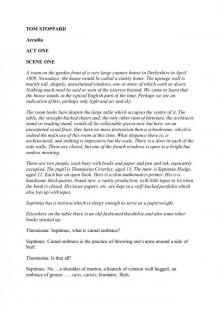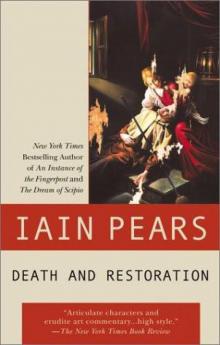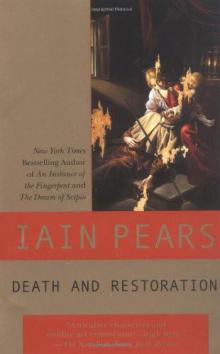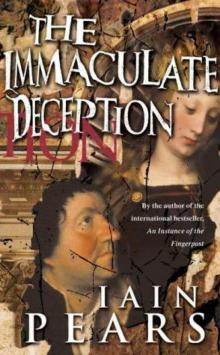- Home
- Iain Pears
The Raphael Affair Page 2
The Raphael Affair Read online
Page 2
His return to Rome had been one of the great joys of his career, and he had spent endless evenings walking the streets, revisiting old and favourite sites like the Imperial remains in the Forum, the quietly confident medieval churches and the extravagant baroque monuments. He was free to wander at his leisure, and blessed the bachelor status which permitted it.
As he and Flavia walked now, he constantly looked around him, and took his assistant on a slightly devious route to their destination. The case they were on was not so urgent that five minutes would make any difference. It was one of those Roman spring mornings which turns the city, for all its traffic jams, noise and untidiness, into a place of magic. The ochre buildings stood out against a clear blue sky, the smells of coffee and of food drifted out of bars and restaurants, there was a hum of preparation as the crisp and immaculate waiters set out tables and chairs in small piazzas, talking incessantly as they clipped the fresh white tablecloths in place and arranged flowers in the miniature vases. A few tourists were in evidence, looking tired as usual and dressed in the crumpled clothes and backpacks that were their invariable uniform. But there were not many; the year was too young, and the annual invasion was still several weeks away. For the time being, Rome was for the Romans, and it seemed like very heaven.
The way to their destination lay through the middle of the Campo dei Fiori market. East of this ran the via Giubbonari, a thin, straight lane lined with clothes and shoe shops behind the ruins of Pompey’s Theatre. It was far too narrow for any sort of car, but nonetheless several Fiats were wedged halfway down it, horns honking as the pedestrians did their best to make their way past. Just beyond these, in a small passageway on the left that was lined with second-hand booksellers, was Santa Barbara.
It was a tiny church, unvisited even by Bottando. It appeared virtually derelict, and was small enough to look almost like a model. Unlike the great basilicas of the city, this was very much a parish church. Built probably in the seventeenth century, its design was entirely conventional, the sort of thing that even an attentive tourist would pass by without bothering to visit.
The first view of the inside confirmed that the tourist would probably have been correct in his decision. The ceiling was of plain greyish plasterwork, there were no chapels along the side and the decorations were commonplace. Nonetheless, it still gave Bottando that brief moment, as his body registered the coolness of the interior, his nose caught the faint smell of old incense, and his eyes slowly adjusted to the gloom, that always made him delight in visiting even the most modest of Rome’s churches. Like nearly all small churches, there was something sad, neglected, but entirely welcoming about Santa Barbara. The one discordant note was that someone, evidently the priest, had decided to erect a modern altar, which stood out brashly in the old and worn building. Bottando heard Flavia sniff with disapproval.
‘Modern priests trying to drum up fresh trade,’ she commented.
‘Maybe,’ Bottando replied. ‘I suppose in this area you have to do something. It would be a pity to wake up one day and find that your entire congregation had died of old age.’
‘I suppose so. But I’ve never got on with hairy-chested clerical enthusiasm. The intense beady look in their eyes always makes me uncomfortable. Give me corpulent corruption any day.’
Bottando began to remark that he would never have thought she was interested in priests. He was trying to push his mind off the subject of his own little paunch, and the worry that this signified decadence in his assistant’s mind, when the subject of their discussion came through a small door behind the old altar.
At first sight, he didn’t fit the caricature of the tall, gaunt, jesuitical type that Flavia evidently had in mind. He didn’t look at all like the sort who spend a few years doing good in the suburbs before rushing off to upset the Pope by running guns in South America. Short, pink and fleshy of face, he seemed more inclined to stay in Rome with a cosy sinecure in the Vatican. But, thought Bottando, you never can tell with priests. At least his greeting when Bottando introduced himself was courteous.
‘I gather that you have lost a painting,’ the policeman began once the preliminary polite noises were over. ‘As I have been told it might have been stolen, I thought I had better make some enquiries.’
The priest frowned, cupping his hands together in front of his stomach in a gesture of clerical thoughtfulness. ‘I can’t imagine who told you that. There used to be an altar painting, true. But we sold it a month or so ago.’
‘Sold it? To whom? Isn’t that church property? I thought these sales normally went through the Vatican. They generally tell us about them.’
The priest looked uncomfortable. ‘Well, it’s like this.’ He paused. ‘Do you have to make a report or something? I really don’t want to get into a bureaucratic muddle over forms and things.’
‘It all depends. We’ve been told that a painting here was stolen. The niceties of Vatican routine are not our concern if it wasn’t.’
‘It wasn’t.’ He thought for a moment, then launched into an explanation. ‘I run a small programme for the addicts who live in the Campo area – food, shelter, some attempts to keep them off drugs, and awake.’ Bottando nodded and politely encouraged him to get on with it. He had come across dozens of these individual programmes in Milan, generally run by well-meaning priests. As a rule, they didn’t even begin to scratch the surface of the problem, but the state provided no better alternative.
‘We need a lot of supplies and, as you can see, it’s a poor parish. We don’t get any donations from visitors, not a penny from the diocese, nothing from the city. About a month ago a man appeared and wanted to buy the altarpiece. He offered enough money to keep the programme going for a year and I took it. The sale wasn’t registered with the Vatican because it would have taken most of the money. I decided that my addicts needed it more.’
Bottando nodded again. It happened all the time and was understandable, even if it did make his job more difficult. ‘How much did he pay?’ he asked.
‘Ten million lire,’ the priest replied. ‘I knew all about the painting. It’s virtually worthless. I told him so, but he said it was for a collector who wanted a piece by Mantini and was prepared to pay over the odds for it.’
‘Did he give you a receipt or anything like that?’
‘Oh yes, it was all done properly. The deed of sale was even franked properly. If you will wait I’ll get it.’ He hurried back to the sacristy and returned a few moments later with a large piece of white, lined paper with a stamp in the top-right corner. ‘There,’ he said. ‘Sold, One Reposo by Mantini from the Church of Santa Barbara, Rome, for ten million lire. Dated 15 February and signed by myself and Edward Byrnes, dealer. I see he gave no address. I’d not noticed that before. But he paid me in cash and gave me a donation for the programme as well, so I suppose that doesn’t matter much.’
2
At about eight that evening, Flavia di Stefano sighed, dumped the remainder of her work, finished and unfinished, in the ‘out’ basket and walked briskly out of the office. It had been a busy day, and not a particularly satisfying one.
After the visit to Santa Barbara, the rest of her day had been taken up with routine enquiries about the Mantini, all of them frustrating for someone who loved finding corruption in high places. Everything about the transaction was entirely legal. The owner had wanted to sell, the buyer had taken the picture to England and had been scrupulous about informing everybody of his intentions. All the forms had been filled in properly, and every legal obstacle with the arts ministry, the treasury and the customs surmounted by the rulebook.
A model of a respectable art dealer in operation. Except that Sir Edward Byrnes, prince of London art dealers, might have been taking a Raphael out rather than some piece of junk. But an afternoon spent combing through the penal code had produced nothing which gave them a case. If Byrnes had painted over the Raphael and concealed the fact, a clear crime. If he had smuggled it out, ditto. If he had stolen it, no troub
le. In all those cases they could probably have recovered the picture. But, as far as she could tell, there was nothing against taking out a Raphael covered with a Mantini, if you were not the one who’d put the Mantini over it in the first place. And Byrnes would say he didn’t know there was anything special about the picture at all. He’d be lying through his teeth, of course, but nothing could be done about it.
It was annoying. Doubly annoying, in fact. Flavia took it for granted that all art dealers were crooked at some level. Their business, after all, consisted of buying things that they knew the sellers could get more for elsewhere. Byrnes, however, was an absolute model of propriety. Utterly fluent in Italian, he often donated works to Italian museums and lent other pieces for exhibitions. His services in other matters had been rewarded with honours in Italy and France, as well as with his knighthood. By reputation a distinguished and learned man, there was not a trace of his ever having even bent the rules, let alone broken them. It was infuriating and, to Flavia, merely demonstrated that he was too clever to get caught.
It was also annoying because the Italian woman, in this if not much else, was patriotic. For hundreds of years the rest of the world had picked over Italy and removed its greatest art treasures. Nowhere in Italy now was there a museum that compared with the National Galleries in London or Washington, or the Louvre in Paris. Many paintings only remained in Italy because they were stuck on to the walls, though she had even heard that one American millionaire in the twenties had offered to buy the church in Assisi so that the Giotto frescos decorating it could be shipped back to Arizona. For Italians to lose a Raphael was dreadful, even if they had not even known they had it.
Grumbling thus to herself, Flavia walked quickly along the streets, heading towards the Piazza Navona. She had agreed to meet her erstwhile prisoner for dinner, so she could go over some of the details of his story in an atmosphere that might make him more forthcoming. Not that she thought Argyll had been lying. But an interrogation by the police after a night in the cells often makes people forget little details.
The hurry was because she had almost forgotten. As she walked, she checked her handbag; the strap around her neck, Roman fashion, to guard against pickpockets. There was enough to pay for dinner for two. She had a feeling that her fellow-diner was short of funds, and taking men out to dinner always gave her an agreeable feeling. Her mother would never have gone out with a man on her own. Although she was a liberal sort of mother and countenanced such behaviour in her youngest, the idea of her daughter paying would still have shocked her greatly.
She had arranged to meet her guest at a nearby trattoria. It was not a particularly special one, but near to her apartment, and reliable. Like most Roman eating establishments, it served wonderful pasta, magnificent antipasti and dreadful main courses. Unlike Turin, which really knew what meat was, Romans seemed satisfied with any sort of boot leather. No matter: she was used to it now. But Roman food was still about the only thing that made her nostalgic for her home town.
Argyll was sitting at a table in the corner and waved cautiously at her as she entered. Ordinarily he would have been good-enough looking, in an English sort of way, not that that sort of thing normally appealed much to her. Tallish, fair-haired, conservatively and not very well-dressed by Italian standards. Most remarkable of all, perhaps, were his hands, which were long and delicate. He had wrung them together incessantly during the formal interview. They looked as though they would have been better employed playing the violin, or something. At least, he didn’t now seem to be twitching and fiddling so much.
Being freed from temporary incarceration indeed seemed to have done him good, and Flavia remarked on the fact.
‘For someone who has just mislaid a Raphael you seem remarkably cheerful,’ she said.
He beamed at her. ‘I suppose so. By rights I ought to be dreadfully depressed. On the other hand, of course, the whole business proves I’m right, even though it wasn’t quite the type of public acclaim I’d had in mind. Besides which, being arrested by the police is quite interesting, in an odd sort of way.’
‘They didn’t treat you badly, then?’
‘Not at all. Charming people. They even let me go out for lunch, as long as I promised to be back in my cell in three hours. I can’t see the boys in blue in London operating in quite such a free and easy fashion.’
‘I imagine that by then they’d decided you weren’t a public menace. Didn’t the whole business upset you at all, though?’
‘Well, yes, it did,’ Argyll replied, tucking in to his plate of pasta. ‘It wasn’t what I’d imagined at all. I rather saw myself uncovering the picture and making a grand announcement – after warning the parish priest – in some suitably scholarly magazine. Great sensation. Career made, one happy parish priest and the whole world one Raphael the richer.’
He was speaking in Italian, which he spoke with some fluency. Not perfect by any means, and heavily accented, but more than acceptable. Flavia always believed in speaking Italian to foreigners if possible. Not many of them could, and those who tried could usually only manage phrases culled from guidebooks and street signs, but she felt she should make them practise. She herself had spent years learning English, and saw no reason why others shouldn’t make a similar effort.
‘But now we have one very unhappy parish priest, an even more unhappy Vatican, Byrnes with the picture, and your career very far from made,’ she pointed out. ‘You’re sure that there’s something under it?’
‘I wasn’t at all sure, that’s why I wasted so much money to come here and check. It took me months to get enough to buy the ticket. And I couldn’t check it because it wasn’t there any more. I was just standing around wondering what to do next. And before I could make up my mind, those flatfooted policemen of yours saw the door was open and collared me. But,’ he added, ‘I’m sure there is now. Someone like Byrnes wouldn’t pull off a stunt like this unless he knew it was worthwhile.’
‘What I don’t understand is why you didn’t just write to the priest months ago, tell him your idea, and get permission to have the painting examined. Then he wouldn’t have sold it until it had all been cleared up.’
‘Oh, that’s simple. I’m an idiot. And an apprentice academic as well, which is worse.’ Argyll looked gloomy, put his fork down, the idea clearly having made him lose his appetite. ‘Art history, as you probably know, is a nasty, vicious profession. I reckoned that if I said a word to anyone in Italy, some big shot in the Museo Nazionale would get there first and take the credit. That’s happened before, and who could resist the temptation? It would’ve been the greatest find for years.’
‘It still will be,’ added Flavia a little unnecessarily, dealing a further savage blow to his appetite.
‘Thank you,’ he replied.
Flavia looked at him sympathetically. By all accounts all he’d wanted was a little bit of fame, a small boost to a career in a desperately overcrowded profession. And even that had been snatched from his grasp by Byrnes’s desperate desire for even more money than he already had. ‘Can’t you just write the article anyway? And why tell Byrnes in the first place? You haven’t exactly been playing the master tactician through all this, but that seems the daftest course you could possibly have taken.’
‘I didn’t tell him,’ Argyll said indignantly. ‘I may be dim, but I’m not that bad. I haven’t told a soul. Well, except my supervisor. I had to tell him. But he’s awfully discreet, hates art dealers and has been incommunicado in Tuscany ever since. Can’t possibly have been Tramerton. Nice man really,’ he continued, going off at a conversational tangent. ‘I suppose I should send him a letter about all this. Going to jail to forward historical knowledge should impress even him.
‘As for my article…Well, I will write one. But I’ll have to do something a bit faster to stake my claim. It takes months to get a piece in a decent journal. By the time it came out, everybody would be sick of hearing about bloody Raphael. The moment Byrnes is sure he’s got the right pictu
re, the press will be called in. Sensational discovery, the works. His tame academics will write glowing articles about translucent masterpieces. And when the enthusiasm reaches its peak, the damn thing will move to Christie’s.’
Argyll paused as the waiter brought the next course, which he looked at with distaste. ‘And every museum, every loony millionaire in the world, will be there to bid,’ he went on. ‘Something like the Getty would mortgage its grandmother to have it. Can you imagine what sort of price it will fetch? It will make a bunch of sunflowers by Van Gogh seem bargain basement.’
‘Why so much? It’s not as if Raphaels are thin on the ground. He churned out dozens of pictures.’
‘I know, and they’re all in museums or painted on the walls of the Vatican. There hasn’t been a real one on the market for decades. Let alone a new one discovered. It’s all supply and demand. Even if it doesn’t turn out to be very good, it’ll still fetch a fortune. Especially with a story like this attached to it.’
‘Not a bad return on a ten million-lire investment.’
‘That’s what he paid?’ Argyll paused to consider the iniquities of the world. ‘That makes it even worse. Even I could have raised that much. Well, almost, anyway.’
He had a well developed, if somewhat morbid, sense of humour, Flavia noted. He was also self-deprecating and appeared to be intelligent, despite apparently deliberate attempts to hide the fact. From being a simple business venture, the meal was turning into a moderately enjoyable occasion.
‘Tell me,’ began her guest in an ostentatious attempt to change the subject, and demonstrate that he wasn’t entirely obsessed with errant masterpieces, ‘What’s your job like? Plenty of work? Job satisfaction?’
She grimaced. ‘Certainly plenty of work. It’s like living under a permanent avalanche. Someone or other calculated that one work disappears every ten minutes. It’s amazing there’s anything left to steal.’

 The Dream of Scipio
The Dream of Scipio Stone's Fall
Stone's Fall The Last Judgement
The Last Judgement An Instance of the Fingerpost
An Instance of the Fingerpost The Bernini Bust
The Bernini Bust Arcadia
Arcadia Death and Restoration
Death and Restoration The Raphael Affair
The Raphael Affair The Titian Committee
The Titian Committee The Immaculate Deception
The Immaculate Deception Giotto's hand
Giotto's hand The Portrait
The Portrait The Bernini Bust ja-3
The Bernini Bust ja-3 Death & Restoration ja-6
Death & Restoration ja-6 The Immaculate Deception ja-7
The Immaculate Deception ja-7